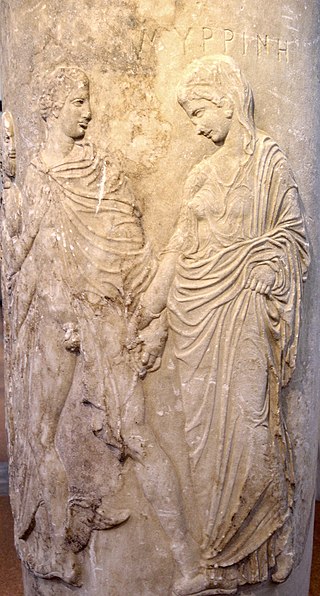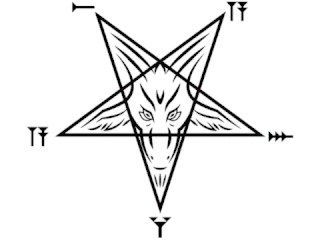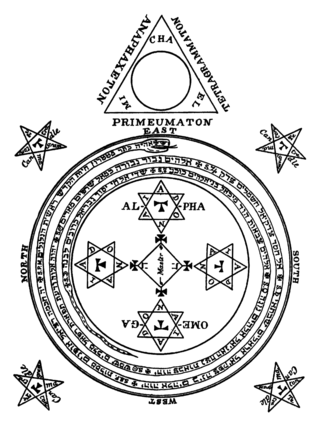
Divination is the attempt to gain insight into a question or situation by way of an occultic ritual or practice. Using various methods throughout history, diviners ascertain their interpretations of how a querent should proceed by reading signs, events, or omens, or through alleged contact or interaction with supernatural agencies such as spirits, gods, god-like-beings or the "will of the universe".

A grimoire is a textbook of magic, typically including instructions on how to create magical objects like talismans and amulets, how to perform magical spells, charms, and divination, and how to summon or invoke supernatural entities such as angels, spirits, deities, and demons. In many cases, the books themselves are believed to be imbued with magical powers, although in many cultures, other sacred texts that are not grimoires have been believed to have supernatural properties intrinsically. The only contents found in a grimoire would be information on spells, rituals, the preparation of magical tools, and lists of ingredients and their magical correspondences. In this manner, while all books on magic could be thought of as grimoires, not all magical books should be thought of as grimoires.
A magical organization or magical order is an organization or secret society created for the practice of initiation into ceremonial or other forms of occult magic or to further the knowledge of magic among its members. Magical organizations can include Hermetic orders, esoteric societies, arcane colleges, and other groups which may use different terminology and similar though diverse practices.

Numerology is the belief in an occult, divine or mystical relationship between a number and one or more coinciding events. It is also the study of the numerical value, via an alphanumeric system, of the letters in words and names. When numerology is applied to a person's name, it is a form of onomancy. It is often associated with astrology and other divinatory arts.
The occult, sometimes called esotericism and literally meaning "unseen" or "obscured", is the category of practices, beliefs and knowledge in all fields which remains hidden or encrypted from others, usually the general public, either deliberately or incidentally. Commonly, it also refers to paranormal or supernatural knowledge, beliefs and practices which generally fall outside the scope of mainstream religion and science, including phenomena of otherworldly agency, such as magic and its varied spells. While experimental spiritualists, secret societies and intelligence agencies are best known for using occultism in the modern world, it has played a major role throughout history, most commonly used to defend sacred knowledge from persecution, i.e. by practitioners of folk-spirituality and alchemy to defend against widespread persecution and extermination by the Catholic church. Occultism may also be implemented for the protection of the general public by insulating dangerous information such as weapons of mass destruction. Within systems of scarcity, it is often used to maintain a competitive advantage over others who are not initiated. Sometimes, occultism may occur within social systems in an accidental manner, usually as a consequence of systemic dysfunction or within a disinformation system. The occult may also simply refer to, and manifest within, areas of perceptual limitation.

Fortune telling is the unproven spiritual practice of predicting information about a person's life. The scope of fortune telling is in principle identical with the practice of divination. The difference is that divination is the term used for predictions considered part of a religious ritual, invoking deities or spirits, while the term fortune telling implies a less serious or formal setting, even one of popular culture, where belief in occult workings behind the prediction is less prominent than the concept of suggestion, spiritual or practical advisory or affirmation.

Psychopomps are creatures, spirits, angels, demons, or deities in many religions whose responsibility is to escort newly deceased souls from Earth to the afterlife.
Christian views on magic vary widely among Christian denominations and among individuals. Many Christians actively condemn magic as satanic, holding that it opens the way for demonic possession. Some Christians simply view it as entertainment. Conversely, some branches of esoteric Christianity actively engage in magical practices.
Many Wikipedia articles on religious topics are not yet listed on this page. If you cannot find the topic you are interested in on this page, it still may already exist; you can try to find it using the "Search" box. If you find that it exists, you can edit this page to add a link to it.

Ceremonial magic encompasses a wide variety of rituals of magic. The works included are characterized by ceremony and numerous requisite accessories to aid the practitioner. It can be seen as an extension of ritual magic, and in most cases synonymous with it. Popularized by the Hermetic Order of the Golden Dawn, it draws on such schools of philosophical and occult thought as Hermetic Qabalah, Enochian magic, Thelema, and the magic of various grimoires. Ceremonial magic is part of Hermeticism and Western esotericism.
The following outline is provided as an overview of and topical guide to spirituality:
The seven rays is a concept that has appeared in several religions and esoteric philosophies in both Western culture and in India since at least the sixth century BCE.
Romani folklore encompasses the folktales, myths, oral traditions, and legends of the Romani people. The Romani were nomadic when they departed India during the Middle Ages. They migrated widely, particularly to Europe, while other groups stayed and became sedentary. Some legends say that certain Romani have passive psychic powers such as empathy, precognition, retrocognition, or psychometry. Other legends include the ability to levitate, travel through astral projection by way of meditation, invoke curses or blessings, conjure or channel spirits, and skill with illusion-casting. The belief in vampires originated from the Roma. The Roma from Slavic countries believe in werewolves. Romani chovihanis often use a variety of herbs and amulets for protection. Garlic is a popular herb used by the Roma.

Hermetic Qabalah is a Western esoteric tradition involving mysticism and the occult. It is the underlying philosophy and framework for magical societies such as the Golden Dawn, has inspired esoteric Masonic organizations such as the Societas Rosicruciana in Anglia, is a key element within the Thelemic orders, and is important to mystical-religious societies such as the Builders of the Adytum and the Fellowship of the Rosy Cross.
Practical Kabbalah in historical Judaism, is a branch of the Jewish mystical tradition that concerns the use of magic. It was considered permitted white magic by its practitioners, reserved for the elite, who could separate its spiritual source from qlippoth realms of evil if performed under circumstances that were holy (Q-D-Š) and pure, tumah and taharah. The concern of overstepping Judaism's strong prohibitions of impure magic ensured it remained a minor tradition in Jewish history. Its teachings include the use of Divine and angelic names for amulets and incantations.

The phrase false god is a derogatory term used in Abrahamic religions to indicate cult images or deities of non-Abrahamic Pagan religions, as well as other competing entities or objects to which particular importance is attributed. Conversely, followers of animistic and polytheistic religions may regard the gods of various monotheistic religions as "false gods", because they do not believe that any real deity possesses the properties ascribed by monotheists to their sole deity. Atheists, who do not believe in any deities, do not usually use the term false god even though that would encompass all deities from the atheist viewpoint. Usage of this term is generally limited to theists, who choose to worship some deity or deities, but not others.

Judika Illes is an American author of esoteric non-fiction books, aromatherapist and tarot reader.

Joy of Satan Ministries, also referred to as Joy of Satan (JoS), is a website and western esoteric occult organization founded in 2002 by Andrea M. Dietrich (a.k.a. Maxine Dietrich). Joy of Satan Ministries advocates "Spiritual Satanism", an ideology that presents a synthesis of Theistic Satanism, Nazism, Gnosticism, Paganism, Western esotericism, UFO conspiracy theories and extraterrestrial beliefs similar to those popularized by Zecharia Sitchin and David Icke.

Goetia is a type of European sorcery, often referred to as witchcraft, that has been transmitted through grimoires—books containing instructions for performing magical practices. The term "goetia" finds its origins in the Greek word "goes", which originally denoted diviners, magicians, healers, and seers. Initially, it held a connotation of low magic, implying fraudulent or deceptive mageia as opposed to theurgy, which was regarded as divine magic. Grimoires, also known as "books of spells" or "spellbooks," serve as instructional manuals for various magical endeavors. They cover crafting magical objects, casting spells, performing divination, and summoning supernatural entities like angels, spirits, deities, and demons. Although the term "grimoire" originates from Europe, similar magical texts have been found in diverse cultures across the world.










